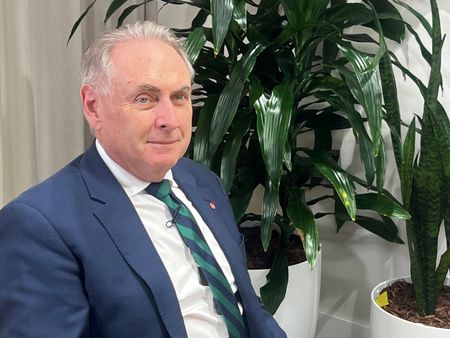By Lewis Jackson and Kirsty Needham
SYDNEY (Reuters) – Australia’s Trade Minister Don Farrell has dangled easier access to the country’s vast critical minerals sector as part of negotiations over a free trade agreement with the European Union ahead of possible further talks as soon as next week.
Negotiations between Australia and the 450-million-person bloc stalled in July, partly over the issue of greater market access for Australian farm products like beef.
Farrell told Reuters in an interview on Thursday that a free trade agreement would simplify European investment in the country’s burgeoning critical minerals sector, in part by smoothing access through mandatory Foreign Investment Review Board (FIRB) screening.
“They get easier access through the FIRB processes,” Farrell said.
Australia supplies around half of the world’s lithium, as well as other minerals like rare earths used in batteries for electric cars and defence, amid a global push to diversify supply chains away from dominant producer China.
“One of the big advantages we’ve got in this relationship is our access to critical minerals, rare earths, hydrogen and ammonia,” Farrell said.
“Other countries are looking to invest in our critical minerals and other renewables. We want European investment… but they’ve got to understand that as part of that process they’ve got to make a realistic offer.”
Germany wants to source rare earths and lithium from Australia as part of a broader strategy to diversify its trading partners and de-risk from China, Foreign Minister Annalena Baerbock said in a video address to a Sydney audience on Tuesday.
Farrell said Europe “understand, just as we have learnt, that putting all your eggs in one basket is a dangerous trade strategy”.
Australia needed foreign investment to develop its clean energy sector, however Farrell anticipated competition from investors in Japan, South Korea, Singapore and the United States.
Australia was an especially attractive place for critical minerals investment from the United States under U.S. Inflation Reduction Act rules because it was one of the few countries to have both mineral deposits and a free trade agreement with the U.S., said Farrell.
Both countries in May signed an agreement that potentially paves the way for Australian critical mineral suppliers to benefit from the sticks and carrots the U.S. Inflation Reduction Act is using to encourage domestic production.
Farrell said he expected to hold teleconference talks with his counterpart EU Commissioner for Trade Valdis Dombrovskis “in the next week or so”, and he had also invited Dombrovskis to Australia.
“I believe we will get a more improved offer and the 64 dollar question is will it be enough,” he said.
(Reporting by Lewis Jackson and Kirsty Needham in Sydney; Editing by Michael Perry)

